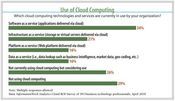KnowledgeTree Upgrades Cloud-Based Document Management Platform
Microsoft Office integration, real-time collaboration, unlimited users, and other features target SMBs in vertical markets with needs unfulfilled by Google Apps.


Analytics Slideshow Calculating Cloud ROI
Analytics Slideshow Calculating Cloud ROI (click image for larger view and for full slideshow)
While Microsoft and Google slug it out in their heavyweight bout for worldwide supremacy, KnowledgeTree appears content to work its own corner of the cloud, tailoring its online document management solution to particular business needs rather than a catchall audience.
On Tuesday, the software provider released several upgrades to its platform that CEO Daniel Chalef said move KnowledgeTree beyond the other online document management tools on the market. The enhancements include desktop co-authoring within Microsoft Office applications, as well as real-time sharing and collaboration with unlimited internal and external users. KnowledgeTree also announced new pricing plans.
Though KnowledgeTree's platform has roots in traditional content management systems rather than productivity software, the addition of Office integration in the cloud seems to put it in direct competition with Google Apps and, to a slightly lesser extent, Microsoft's own Office 365, which is currently in beta and will wrap cloud-based versions of its productivity applications with its existing Business Productivity Online Suite (BPOS). Indeed, KnowledgeTree counts Google Apps among its key competitors, as well as Dropbox, Box.net, and SpringCM.
Chalef said that KnowledgeTree isn't necessarily trying to be that different from other solutions in the cloud. Rather, it's trying to meet business needs it believes aren't currently addressed by the other players in the space. He gave as examples smaller law firms, accounting firms, and "line of business" users -- think finance, control, human resources -- in larger organizations. The common thread? Creating and managing time-sensitive documents such as budgets and contracts that require access control, aging alerts, business process workflows, real-time collaboration, and searchable metadata.
"We're users of Google Apps ourselves," Chalef said. "We really like it a lot." But that doesn't mean they've abandoned Office -- like other organizations that have adopted Google's Web-based software, KnowledgeTree continues to use Office as well.
"I really enjoy Google Docs spreadsheets for small lists and transient content, ephemeral content," Chalef said. But when it comes to budgets, financial models, and other complex documents, he opens Excel. "There's absolutely no way I can do those using Google's online products." He added that Zoho's suite -- which integrates with KnowledgeTree -- is "closer to the ideal" but not quite all the way there.

Slideshow: Cloud Security Pros And Cons
Slideshow: Cloud Security Pros And Cons (click image for larger view and for full slideshow)
Chalef doesn't see Office 365 as a competitor, per se, and said he doesn't believe Microsoft has plans to integrate business process tools -- like those that KnowledgeTree offers -- into its new cloud service. But as the battle between Google and Microsoft wages on, it seems likely that the latter will become a competitor by default.
"We provide a far richer experience than the base Office 365 suite," Chalef said. He added that KnowledgeTree's new integration also supports Office 2007 and 2003.
KnowledgeTree said it serves the small and midsize business market -- with an emphasis on the latter -- and that's true to an extent. Its new pricing plans begin at $35 and go up from there. Because KnowledgeTree now offers unlimited licenses with its plans, it may make particular sense in terms of total cost of ownership for mid-market companies when compared with per-user pricing options. Google Apps charges $50 per user, per year, for example.
But some of KnowledgeTree's key features, such as access control, document alerts, and custom workflows, are reserved for customers with slightly deeper pockets, and the wide range in pricing seem to indicate KnowledgeTree is targeting a similarly wide range of business sizes. KnowledgeTree touts its "Company" plan, which includes those features just mentioned for $475 per month, as its most popular option. Its "Enterprise" package, which includes phone support, a service-level agreement (SLA), custom domain, and offline backups, requires a phone call for pricing.
Chalef pointed out that the distinction between the needs of small and large companies -- and everything in between -- can be blurry, especially in certain industries. When it comes to matters of compliance, for example, smaller companies can have the exact same requirements and challenges as larger companies. To that point, Chalef added that KnowledgeTree has customers with a wide range of budgets, from those that spend just under $200 a month on the "Team" plan to companies that spend tens of thousands of dollars on implementation alone.
Said Chalef: "There are departments within [Forbes] Global 2000 companies that look and smell like SMBs."
About the Author(s)
You May Also Like







